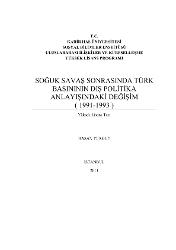| dc.contributor.advisor | Caşın, Mesut Hakkı | en_US |
| dc.contributor.author | Turgut, Hasan | |
| dc.date.accessioned | 2020-07-14T10:08:28Z | en_US |
| dc.date.available | 2020-07-14T10:08:28Z | en_US |
| dc.date.issued | 2011 | en_US |
| dc.identifier.uri | https://hdl.handle.net/20.500.12469/3028 | |
| dc.description.abstract | Sovyetler Birliği'nin çöküşünden sonra Türk Dış Politikası yeni genişleme alanları bulmuştur. Türki Cumhuriyetlerin ortaya çıkması, Türkiye'ye yeni fırsatlar ve stratejik derinlik alanları yaratmıştır. Bu yeni ülkeleri Pazar ekonomisine eklemleme rolü Batı tarafından Türkiye'ye verilmiştir. Şimdi Sovyet hegemonyasından sonra Türkiye yeni hegemon olabilirdi. Nitekim ? Adriyatik'ten Çin'e Türk Dünyası? retoriği de bu niyeti göstermek için söylenmiştir.Soğuk Savaş'ta tehdit komünist ve Sovyet olmak olarak gösterilmiştir. Savaştan sonra bu tehdit ortadan kaybolmuş ve yeni Türki Cumhuriyetlerin varlığı basın ve komuoyunda heyecan yaratmıştır. Sovyetler Birliği'nin dağılması ve Soğuk Savaşın bitmesi dış politika algılamalarında dönüşüm yaşanmasını sağlamıştır. Türkiye'nin yeni vizyonu, Türki Cumhuriyetlerin büyük ağabeyi rolü etrafında açıklanmaya başlanmıştır.Ama bu iyimserlik çabuk sona ermiştir. Hırvatistan ve Slovenya'nın bağımsızlıkları sonrasında 1992 Mayıs'ında Bosna'da Sırplar ve Müslümanlar arasında iç savaş çıkmıştır. Bu yüzden Türkiye krizi çözmek için inisiyatif almak zorunda kalmıştır. Balkanlar, Türkiye için güvenlik endişeleri, tarihi miras ve Yunanistan'la sert rekabet alanlarından biri olduğu için her zaman önemli olmuştur. Diğer bir mesele ise Dağlık Karabağ çatışmalarıdır. Ermeniler ve Azeriler arasındaki çatışmalar Türkiye'yi de soruna müdahil etmiştir. Fakat bu iki kriz Türk dış politikasının enerjisini aşmıştır. Bu yüzden Türkiye'nin politikalarının inandırıcılığı hem içerde hem dışarıda sorgulanmaya başlanmıştır. Bunlara ilaveten, Türk dış politikasının geleneksel konuları ( Kıbrıs meselesi ve Türkiye-AB ilişkileri ) basının dış politika ajandasına zenginlik sağlamıştır.Bu çalışmada Soğuk Savaş sonrası dönemdeki yeni gelişmeler ki bunlar 1991-1993 yıllarını kapsamaktadır, Türk basınının gözünden aktarılmaya çalışılmıştır. Ayrıca bu çalışmada Türk kamuoyu algılamaları ve basının refleks ve algılamaları da sınanmıştır. | en_US |
| dc.description.abstract | After the collapse of Soviet Union, Turkish Foreign Policy (TFP) found new expansion areas. Emerging Turkic republics have created new opportunities and strategic depth areas for Turkey. The role of articulation of these new countries to market economy has been given to Turkey by Western. Thought that, after Soviet hegemony, Turkey could be the new hegemon. Thus, rethoric of ?Turk World from Adriyatic to China? was said to show this intent.In the Cold War, the threat was shown ?to be communist and Soviet?. After the war, this threat disappeared and the existence of new Turkic republics created excitement in the Press and Public Opinion. Disintegration of the USSR and the end of the Cold War led to transformation in the Foreign Policy perception. Turkey?s new vision began to explain around the role of big brother of Turkic republics.But this optimism ended quickly. After independences of Croation and Slovenia, there was a civil war between Serbs and Muslims in Bosnia in May 1992. Therefore, TFP had to take an initiative to solve these crisis. Balkans has always been important for Turkey because of security concerns, historical heritage and being one of the tough competition area between Greece. Another issue was Nagorno-Karabakh conflicts. Clashes between Armenians and Azeris has been involved Turkey to this conflicts. But these two crisis situations has exceeded Turkish Foreign Policy?s energy. Because of this Turkey?s policies persuasiveness started to be questioned both inside and outside. In addition to these, traditional issues of TFP ( The Cyprus İssue and Turkish-European Union Relations ) has provided wealth in the field of press?s foreign policy agenda.In this study it?s tried to cite the new developments in the Post-Cold War, which included the years 1991-1993, in the eyes of Turkish press. Also in this study Turkish public opinion perceptions and press?s reflexes and perceptions were examined. | en_US |
| dc.language.iso | tur | en_US |
| dc.publisher | Kadir Has Üniversitesi | en_US |
| dc.rights | info:eu-repo/semantics/openAccess | en_US |
| dc.subject | Dış politika | en_US |
| dc.subject | Kamuoyu | en_US |
| dc.subject | Türk Basını | en_US |
| dc.subject | Basın-Dış Politika İlişkisi | en_US |
| dc.subject | Soğuk Savaş Sonrası Türk Dış Politikası | en_US |
| dc.subject | Foreign policy | en_US |
| dc.subject | Public Opinion | en_US |
| dc.subject | Turkish Press | en_US |
| dc.subject | Press and Foreign Policy Relations | en_US |
| dc.subject | Turkish Foreign Policy In Post-Cold War | en_US |
| dc.title | Soğuk savaş sonrasında Türk basınının dış politika anlayışındaki değişim (1991-1993) | en_US |
| dc.type | masterThesis | en_US |
| dc.department | Enstitüler, Lisansüstü Eğitim Enstitüsü, Uluslararası İlişkiler Ana Bilim Dalı | en_US |
| dc.relation.publicationcategory | Tez | en_US |
| dc.identifier.yoktezid | 279936 | en_US |
















